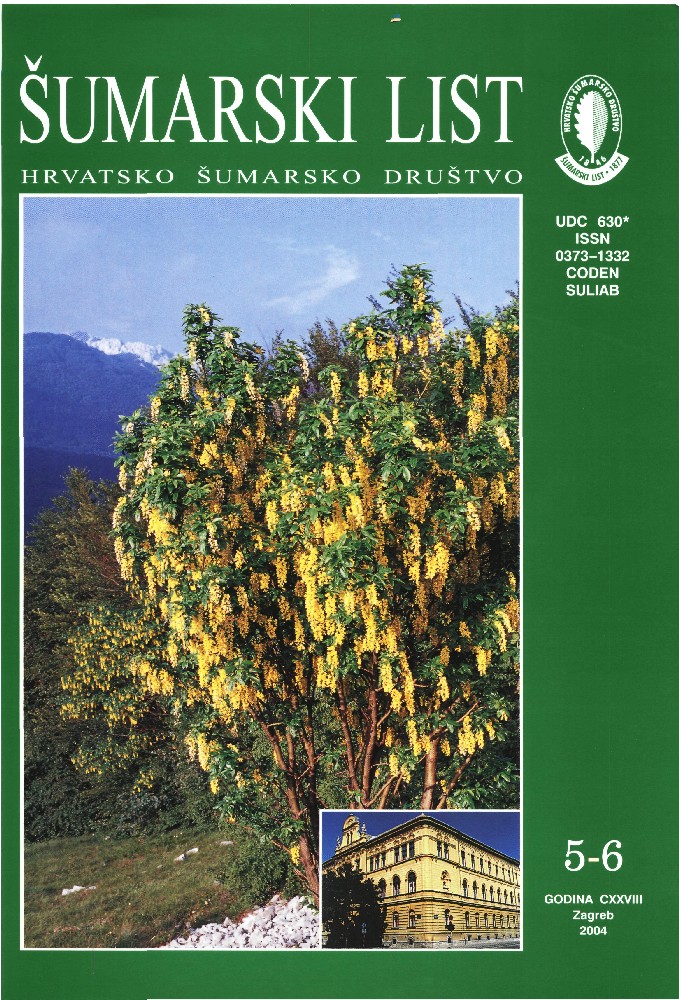
broj: 5-6/2004
pdf (38,8 MB) |
|
||||||||||||||
| IZVORNI ZNANSTVENI ČLANCI | ||
| Pernar, N., Vukelić, J., Bakšić, D., Baričević, D. | UDK 630* 114.4 + 188 | |
| An Insight Into Genesis and Properties of Soil in the Riparian Region of North-Eastern Baranja pdf HR EN | 223 | |
| Krpan, A. P. B., Poršinsky, T. | UDK 630* 363 | |
| Efficiency of Mechanical Felling and Processing in Soft and Hardwood broadleaved stands – Part 2: Efficiency of harvesters in the culture of soft broadleaf trees pdf HR EN | 233 | |
| Zečić, Ž., Krpan, A. P. B., Poršinsky, T., Šušnjar, M. | UDK 630* 375 | |
| Efficiency of tractors 8090 and 9078 in shelterwood fellings of stands in Požega mountains pdf HR EN | 245 | |
| Pilaš, I., Potočić, N. | UDK 630* 561 + 116 | |
| Depedence of intraseasonal variations of tree stem diameter changes, electrical resistanee of cambial zone and groundwater in common oak stand (Q. robur L.) pdf HR EN | 255 | |
| Popijač, M., Seletković, I., Volner, M., Lovrenčić, I., Barišić, D., Kezić, N. | UDK 630* 160 + 161 | |
| Dynamics of 137Cs and 40K Movement in Silver fir Trees on Sljeme Mountain pdf HR EN | 269 | |
| Posavec, S. | UDK 630* 652 | |
| Specificy of Bussines Analyses Entities in Managing with Forest and Forest Land pdf HR EN | 279 | |
| Summary: The specific nature of forestry as an economic activity generates problems in realising the set business plans and accounting commercial operations. Business analysis deals with concepts and methods of perceiving the degree of development, as well as with unrealised possibilities of a business entity. The particular character of analysing business operations of entities dealing with forest management arises, among other things, from essential features of maintaining the forest potential. In managing forests and forestland, it is not always possible to obey the principle of operational profitability, as the omission of any silvicultural treatments jeopardises future increment of wood biomass and leads to a decline in the general forest value. This in turn may have far-reaching consequences on the overall national economy. Furthermore, the specificity of forest management is particularly evident in a long-term cycle of biomass production, an extensive period of time between the initial activities and the achieved economic effects, and in investments into forests which frequently exceed the financial possibilities of forest owners. The achieved degree and the unrealised possibilities of developing forest potential are conditioned by biological factors and by economic-technical treatments. To measure and evaluate the effects of these factors on the survival and growth of a forest, specific knowledge is required combined with specific criteria for analytical assessment of the success of business entities dealing with forest management.The paper discusses economic, business and financial analysis as one of the segments of general economic business analysis in forestry. The basic goal is to establish a scientific approach to evaluating business analysis and construct a method which will be used in practice. The aim is to valorise the currently applied know-how and propose suitable criteria of evaluating the success of business entities dealing with forest management. The paper presents business results of the company “Hrvatske šume” d.o.o., the largest company that manages forests and forestland in Croatia, and the extent to which the set goals of business policy have been achieved on the basis of business indicators. Forest business indicators for Croatia were compared with indicators from European countries. This paper is a contribution to a debate on current classical and neo-classical methods of assessing the value of renewable natural resources and establishing scientific bases for the construction of a suitable method of evaluating forests. Key words: business analysis; renewable resources; forest; valorisation | ||
| Štorga, D. | UDK 630* 582 + 525 | |
| Application of GIS in Stand Extraction According to Dendrometric Parameters pdf HR EN | 287 | |


